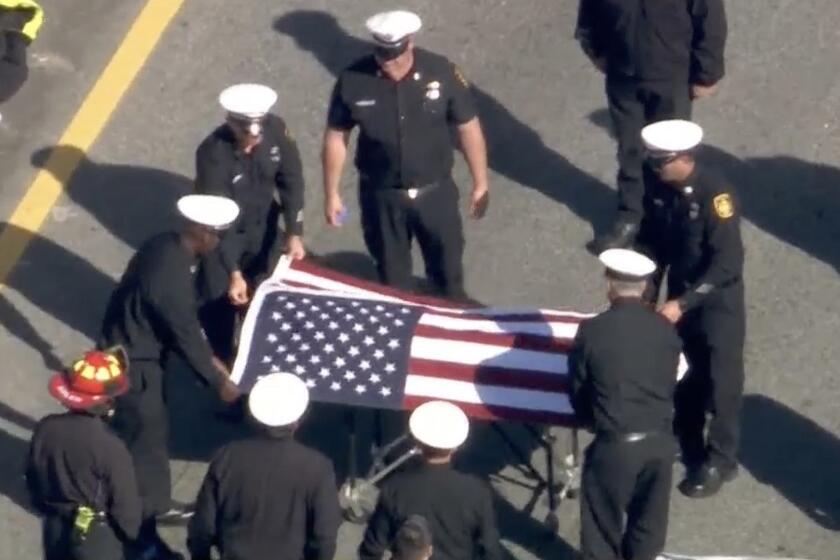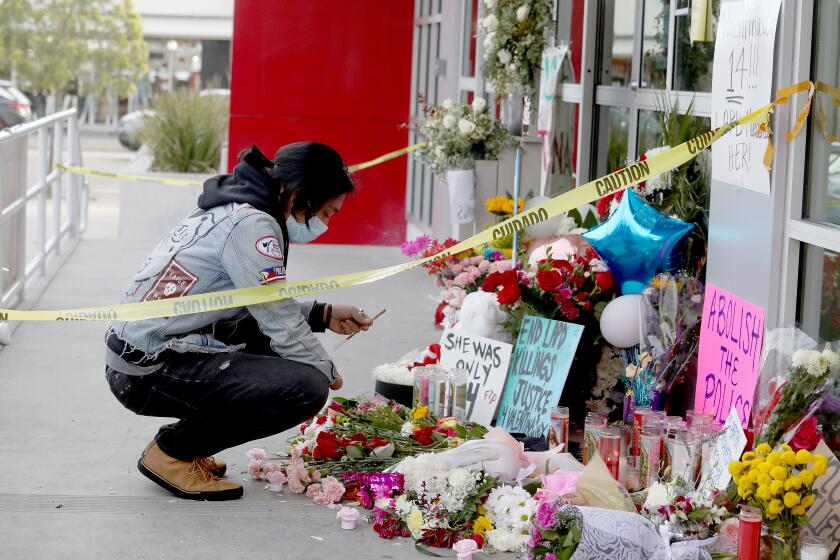The Bratton difference
POLICE CHIEF WILLIAM J. BRATTON’S recent dismissal of an officer who beat a suspect with a large metal flashlight didn’t make a lot of news, which is unusual in its own way. There was no public struggle with the police union; the discipline system seemed to work as it ought to. Earlier, a detailed reenactment of the widely criticized police shooting of a 13-year-old car-theft suspect had showed the officer was not in the path of the car backing toward him when he fired, seeming to contradict the officer’s claim that he felt his life was in danger. Again, the system seemed to be chugging along as it should.
What does this ordinariness say about how Bratton is doing? Before we answer, a little recent history.
A police department’s foremost job is to protect citizens. Daryl F. Gates, chief of the Los Angeles Police Department from 1978 to 1992, employed military-style force and tactics, seeing them as a way to stretch the presence and power of a department with fewer police per capita than other major cities.
The result wasn’t so great. In 1990, L.A. recorded 983 homicides and nearly 84,000 violent crimes. Two years later, homicides topped 1,000, about twice the current number even though the population has risen. The most spectacular failure of the Gates era was the 1992 L.A. riots, stemming from the police beating of fleeing motorist Rodney King. The near-withdrawal of the LAPD from the city’s burning, looted streets sealed his departure.
Chief Willie L. Williams, hired from Philadelphia as an outside corrective, never gained either the confidence of the force or a handle on crime.
His successor, LAPD insider Bernard C. Parks, brought his strong moral sense and an iron disciplinary hand. Violent crimes went down dramatically. Officers, though, were dismayed at his micromanagement, even dictating what leather polish they could use, while the Rampart corruption scandal brewed. Parks scorned community policing and touchily regarded a federal consent decree aimed at cleaning up rogue officers as a personal affront. His contract went unrenewed in Mayor James K. Hahn’s toughest decision in office.
Enter Bratton in mid-2002.
Police chiefs get much of the praise and blame for crime rates, whether they deserve it or not. Bratton has instituted a system he used in New York to pinpoint criminal hot spots and blanket them with police resources. Violent crime has stayed at about half what it was under Gates, though cities on Los Angeles’ borders, from Compton to Glendale, are seeing an unsettlingly sharp rise in homicides.
Faced with inherited problems, from too few cops to inadequate computer tracking, Bratton also set about changing the department’s internal culture.
One signal effort, in tandem with Deputy Chief Michael Berkow, was to end the chief-versus-cops mentality of the department’s internal discipline panel, called a board of rights, which at times seems to regard itself as more protector of officers than disciplinary committee. Bratton and Berkow, who is in charge of LAPD professional standards, began settling smaller infractions without a hearing. Only incidents regarded as clearly serious -- like the flashlight case -- went forward.
The result of the streamlining has been a less adversarial process, one that the officers on the discipline board see as more just.
It’s a small work-around that is indicative of a larger attitude: Make what you’ve got work better, if not perfectly. Bratton has also put more officers onto the streets, despite the three-day police workweek instituted by Hahn in a battle with Parks.
Bratton still has a big mouth (which got him in trouble after the police shooting last month of a toddler being held hostage by her father), a Hollywood ego and likely political ambitions. The election of Mayor Antonio Villaraigosa, with his own high-profile and ambitious agenda, could have been cause for anxiety. After all, it was a head-on personal collision with then-Mayor Rudolph Giuliani that pushed out Bratton after two years as New York City’s police chief.
Villaraigosa and Bratton, however, seem aware that they can amplify one another’s strengths. Villaraigosa, though he opposed asking voters for a new city tax to hire police, has put finding other ways to add officers near the top of his list.
Bratton is only three years into a five-year contract. It’s early to talk about a second term (the maximum allowed), but 10 years under a single effective chief shouldn’t be too much to hope for.
More to Read
Start your day right
Sign up for Essential California for news, features and recommendations from the L.A. Times and beyond in your inbox six days a week.
You may occasionally receive promotional content from the Los Angeles Times.






